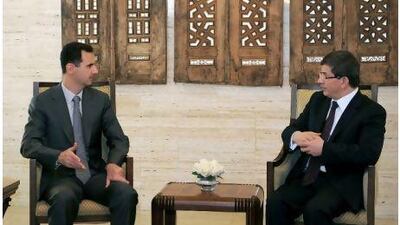DAMASCUS // The Baath party, the old man of Arab nationalist politics, celebrates its 64th birthday today. But in Damascus, the city in which it was formed, Baathist dominance is facing an unprecedented challenge that could make this year its last at the head of a one-party state.
To mark today's anniversary, protesters demanding political freedoms have called for demonstrations outside of Baath party headquarters in the Syrian capital.
With the Baath national command offices sandwiched between the Syrian ministry of defence and the main air force building, the chances of a sustained protest are minimal. Security forces have, of late, quickly and violently broken up demonstrations in far less sensitive areas.
However the very suggestion of such an act of public dissent - it would have been unthinkable even four weeks ago - shows just how much the Syrian political landscape has shifted since the start of anti-government protests last month.
That the Baath party's main offices, rather than other government buildings, are a target for those protests also underlines how indelibly associated with the entrenched ruling elite the once revolutionary and iconoclastic socialist party now is.
In the southern city of Deraa, home to the largest anti-government protests, demonstrators made a point of burning down the Baath party offices, as did crowds in the port city of Latakia - both highly symbolic acts.
Young Syrians at best seem to regard the Baath party as a dinosaur, a throwback to the Cold War era, of less relevance in the modern world than a cathode ray tube television. Syrians of all ages complain about the abuse of power, corruption, nepotism and stagnation the party has come to embody.
It wasn't always that way. In 1947, when it was formed by a handful of young, idealistic and class-conscious Arab intellectuals, who had met up in a Damascus coffee house, the Arab Socialist Baath Party, to give it its full name, was the archetypal outsiders group.
Its basic platform was simple: "unity, freedom and socialism". That meant freedom from foreign occupation and individual oppression, and a fair distribution of wealth in a secular society that, crucially, united Arabs and respected Arab dignity in an era of European colonialism.
That manifesto won it a strong base of support and the opposition of hard-line Islamic groups. One of the Baath's earliest disciples was a young working-class man named Hafez al Assad who would later rise to become president of Syria and party leader. His son, Bashar, inherited power from him in 2000 and continues to head the Baath party and to rule the country.
As with so many revolutionary movements, the Baathists were torn by infighting and, as they consolidated their hold on both Syria and Iraq, the movement took on many of the characteristics it had once vowed to fight against.
In the 1960s, when the Baathists seized power in Damascus, at a time of national and regional tumult, it may have made sense to impose emergency laws to stabilise the country. But those repressive measures proved addictive and, used to destroy any rivals to Baathist dominance, were never lifted.
Those same abusive laws eroded respect for the party among ordinary Syrians and are now at the frontline of a struggle over the future of the country. Civil rights activists and anti-government demonstrators are demanding martial rule be ended immediately.
Similarly, it may have made sense to the Baathists of the 1960s to enshrine in the constitution that the Baath party, and it alone, be the leading organisation of "society and state". That clause, Article 8, is another reasons why opposition has now exploded onto the street, with protesters demanding they be allowed to form independent political parties with a role in running the country.
Within the Syrian Baath party there are still competing factions, with reform-minded groups pushing for changes against those who have no wish to see the status quo end.
Economic modernisers have already won the battle to abandon socialist ideals, saying the state run economy had done nothing but bankrupt the nation. However, in its place the market orientated system has brought growth that has enriched a narrow elite while driving many Syrians closer to poverty.
Meaningful political reforms have been even slower, to the point of not happening at all, something that has dismayed genuine Baathist modernisers. In 2005, the Baath party congress advised that emergency laws be reviewed, a suggestion that was ignored until Syrians took to the streets little more than two weeks ago to forcefully demand it happen.
At the age of 64, the Baath party is diminished from its heyday. The Iraqi wing, an enemy of the Syrian Baathists, was smashed by a US-led military campaign.
In Syria, it remains the official organisation of the state and hugely influential. But real power has been collected in the hands of the president, his family, close political advisers, the military and secret police, rather than in the Baath party as a whole. Although some key leaders may be Baathists, the party itself, and rank and file party cadres have limited say in policy-making.
Because of unprecedented public shows of dissent the Syrian authorities are now talking of political reform, including of the emergency law and of Article 8.
Previous promises of change did not result in action but, with emboldened opposition activists now on the streets, analysts say there is a window of opportunity in which peaceful, meaningful reform can take place.
If that chance is taken, this will be the last birthday the Baath party will celebrate with its political monopoly intact. If the chance is missed however, if the Baathists refuse to relinquish some of their power, many analysts and ordinary Syrians alike fear the country could be walking on a path towards civil war.

